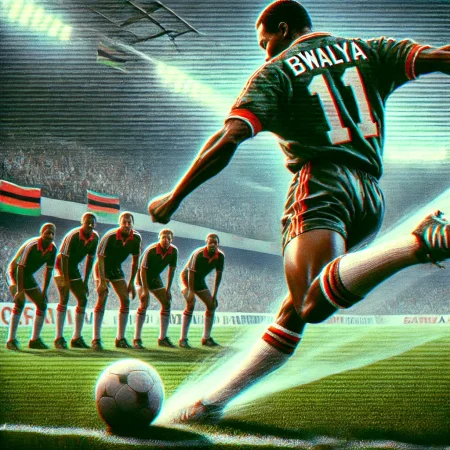
Some leadership lessons don’t come from textbooks or boardrooms. They come from the places we loved as kids, the heroes we admired, and the mistakes we didn’t even know we were making.
I would later learn that leadership often asks you to unlearn the habits that once made you successful.
When I Was Young, Football Was My Life
When I was young, football was everything to me. I slept with my ball, a makeshift creation of plastic bags and rags, tucked close to my side. We played every chance we got, chasing the ball barefoot down the dusty roads of Mushili, rarely stopping for traffic or pedestrians. When the game was on, nothing else mattered—winning was all that counted, and the rest of the world faded away. Sometimes I forgot to eat. I lived and breathed football. My childhood revolved around it.
Whenever the Zambia national team had a game on TV, the streets of Mushili would empty, leaving behind an eerie, almost ominous silence, as if the earth had opened up and swallowed all the residents. Football wasn’t just a sport but a faith we all shared as a country.
At the time, my hero was Kalusha Bwalya, the only player from Southern Africa to ever win African Footballer of the Year. Fate spared him from the tragedy off the coast of Gabon that took the lives of the entire Zambian national team. Kalusha had been scheduled to meet them later in Senegal. Instead, he found himself leading a new team, carrying the weight of a nation’s grief and hope.
Under his leadership, Zambia came heartbreakingly close to qualifying for the World Cup.
We lost the African Cup of Nations final to Nigeria that same year.
Kalusha’s leadership on the pitch was something you could feel.
Whenever a free kick was awarded near the penalty area, we believed. We knew Kalu would score, and he scored many times.
No one else in Zambia’s history could match him at dead balls.
The Hero Who Couldn’t Fully Let Go
Years later, Kalusha coached the national team, but the player inside him never entirely left. There were times when Zambia needed a goal, and Kalusha would change out of his coaching gear, put on a jersey, and step onto the field.
I remember one moment clearly: Zambia needed just one goal. Kalusha came on, took the free kick, scored, and won the match for us.
Even then, I wondered: Why hadn’t he trained someone else to take free kicks like he could?
He struggled to let go and transition from player to coach.
A Memory That Came Full Circle
That memory stayed with me years later when I was managing a maintenance team at a plant. One day, a major outage hit. As I watched, the team lead grabbed his PPE and started troubleshooting himself. The entire team stopped working and watched their supervisor do the troubleshooting. When he found the problem, he explained it to me proudly.
I told him:
“I’m not impressed.”
The glee on his face evaporated. His eyes opened wide in stunned silence as he stared at me askance.
“Why did you get in there?” I pointed.
“I wanted to help the team out. I’ve worked on these breakers for several years.”
“Your job changed from being an individual contributor to managing a team. It’s not about solving problems yourself anymore. It’s about helping the team solve them.”
He nodded and closed his eyes like the lightbulb had just lit up in his head.
I continued, “Every time you jump in, you take away the opportunity from others to learn.”
“I see it.”
“Did you notice what happened to your team when you jumped in?”
“No.”
“They stopped doing anything and watched you.”
He nodded again.
“You should be watching them, not them watching you. You should have been giving them feedback and helping them figure it out. You should have walked them through the thought process and how you would do it. That way, they can repeat what you are teaching them next time. If this happens again, they will wait for you to do it because you have not equipped them to do it themselves. Also, you will not be able to know what their capabilities are. Their confidence will not grow because they may think you don’t trust them to fix it.”
Suffice it to say that was the last time the team lead jumped in. The team learned and could do it themselves. The team lead was able to work on other things while the team concentrated on troubleshooting instead of watching their supervisor do the work.
The Hardest Part of Leadership
There’s a real temptation when you first lead a team:
– It’s easier to do it yourself.
– It’s satisfying to solve the problem.
– It’s safer than trusting someone who’s not as skilled yet.
But leadership isn’t about staying safe. It’s about letting people grow, even when it’s messy. Every minute you spend doing the work yourself is a minute you steal from someone else’s growth. It’s not easy to watch someone struggle. But that’s where the real growth happens—for them and you.
Practical Anchors for New Leaders
When you step into leadership, here are a few things that matter:
- You must know your people, their strengths and weaknesses, interests, passions, motivations, etc.
- You must have scheduled one-on-one meetings with your direct reports to discuss their needs. This is their time.
- Endeavor to play to their strengths or, in other words, leverage their natural capabilities.
- Constantly assess their training needs and create a development plan with the employee.
Building People, Not Trophies
Leadership will always test your patience. It will always ask you to believe in people before they fully believe in themselves.
Ultimately, it’s not about how well you played the game but how many others you taught to play it even better.

Testing comments